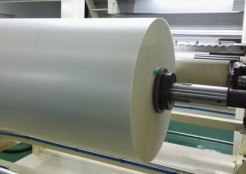Informations
Artificial marble, also known as engineered
marble, is a popular material in the construction industry due to its aesthetic
appeal, durability, and ease of maintenance. The production process of
artificial marble involves the use of molds that require effective release
agents for a smooth surface finish. In this essay, we will discuss the
importance of PVA water-soluble film for mold release in the production of
artificial marble.
Why Use PVA Water Soluble Film for Mold
Release in Artificial Marble Production?
PVA water-soluble film is a type of polymer
film that dissolves quickly in water, leaving behind a clean and smooth
surface. This film is commonly used as a mold release agent in various
industries, including the production of artificial marble.
The use of PVA water-soluble film in
artificial marble production offers several advantages. Firstly, it provides an
effective release agent for the mold, which ensures that the artificial marble
does not stick to the mold during the production process. This helps to
maintain the shape and quality of the finished product. Additionally, PVA
water-soluble film is environmentally friendly, as it does not leave any
residue or harmful chemicals that can harm the environment.
Another benefit of using PVA water-soluble
film in artificial marble production is that it improves the surface finish of
the final product. The film acts as a barrier between the artificial marble and
the mold, preventing any imperfections or roughness from appearing on the
surface of the finished product. This results in a smooth and polished surface,
which enhances the overall aesthetic appeal of the artificial marble.
Moreover, PVA water-soluble film is easy to
apply and remove from the mold. It can be easily cut to fit the shape of the
mold, and it dissolves quickly in water, leaving no residue or trace of the
film on the artificial marble.
In conclusion, PVA water-soluble film is an
essential component in the production of artificial marble. Its use as a mold
release agent ensures a smooth surface finish, prevents sticking to the mold,
and is environmentally friendly. It is a cost-effective solution that enhances
the overall quality and aesthetic appeal of the artificial marble.





